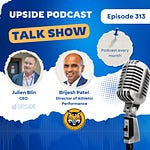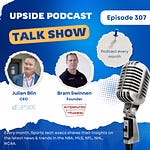This week we have the honor to interview again a group of sports performance executives to talk about the latest trends in the world of sports performance and rehabilitation.
Jason Han, the former head of rehabilitation at LAFC (MLS). Jason is also the head of business development in North America at OneBase health.
Michael Messer, the head of rehabilitation at Nashville SC (MLS).
Dr Derek Lawrance, the Assistant Athletic trainer of the U.S. Men’s Soccer National.
📝Show Notes: Through this interview, we touched on:
The most important factor(s) in developing an athlete for long-term success (e.g., mindset, training consistency, recovery).
How the approach to mental preparation evolved in elite soccer over the last few years, and the role that sports psychology play in preparing athletes for high-pressure games, such as World Cup matches or the MLS cup.
On how teams optimize player load management to prevent burnout due to the increasing demands of club and international schedules.
On how some promising innovations in nutrition, sleep tracking, or recovery that they see could shape the future of elite soccer.
On one major trend that will define elite soccer performance in the next five years.
You can read the full transcript of the podcast interview located at the top of this blog post.
Here are some of the best quotes of our conversation with Michael, Derek and Jason:
Q1. What is the most important factor in developing an athlete for long-term success?
Derek Lawrance:
"For me, it's definitely maturity because it's going to go such a long way in their development. Once they're mature, they have a better understanding of how to take care of themselves, how to have a better mindset, how to approach each day as a professional. Maturity affects everything—how they handle setbacks, how they listen to coaches, and how they interact with teammates. Some players get thrown into a professional environment at 14 or 15 and struggle to adapt, while others take a more gradual path and develop that mindset over time. It’s not something you can necessarily teach, but it makes all the difference in how an athlete progresses."Jason Han:
"Especially when you have a team where younger players are mixed in with veterans, those older players serve as role models for what maturity really means. I think about someone like Giorgio Chiellini—when he came to LAFC, the younger players saw the way he approached training, the way he warmed up, how he managed his recovery, his diet, his preparation. It wasn’t just his talent that kept him at the top level for so long—it was the consistency in all those areas. Young players who can recognize that and learn from those examples have a much better chance of sustaining long-term success."Michael Messer:
"The quicker that players realize how to maximize the resources at their disposal—whether it be learning from other players, working closely with the staff, or taking advantage of recovery tools and training modalities—the quicker they'll reach their peak performance. It’s about open-mindedness. Some players take years to understand that they have access to tools that can help prolong their careers and optimize their bodies. The ones who buy in early—who really take responsibility for their own development—are the ones who end up having the longest, most successful careers."
Q2. How has the approach to mental preparation evolved in elite soccer? What role does sports psychology play in preparing athletes for high-pressure games?
Jason Han:
"Being in the training room, you are essentially the psychologist day in and day out. You hear everything—players vent about their frustrations, their doubts, their confidence levels. I was fortunate enough to be around players like Carlos Vela, Giorgio Chiellini, and Gareth Bale, and what stood out was their ability to stay calm within a storm. You could see it in high-pressure moments—they had an incredible ability to block out distractions and focus on what mattered. But what’s interesting is that none of them were using things like biofeedback or sports psychology apps. They weren’t sitting in mind rooms or using high-tech tools for mental training. A lot of it came from experience and an internal mindset they had developed over years."Derek Lawrance:
"Sport psychology is such an individualistic thing—some players need it, some don’t. Some of the highest-level players have found their own ways to stay focused and mentally resilient. But for others, it’s a huge factor in their performance. We joke about Gareth Bale’s love for golf, but for him, that was an important mental escape. It gave him a way to reset, to get away from the pressures of football. For other athletes, it might be meditation, reading, or playing chess like Wemby from the Spurs. The key is recognizing that mental training is different for everyone. Some players thrive under pressure, while others really need structured mental support to perform at their best."Michael Messer:
"More MLS teams are bringing in mental performance coaches to work with athletes one-on-one, and I think that’s a good step forward. It’s different from a sports psychologist—these coaches work on developing mental strategies to help players stay calm and perform under pressure. It’s becoming more common to see teams invest in culture-building specialists who work with the coaching staff to create an environment where players feel mentally supported. But at the end of the day, every athlete is different. Some are naturally mentally strong and don’t need a lot of external support, while others need structured guidance. The challenge is making sure those resources are available when players do need them."
Q3. With increasing demands of club and international schedules, how do teams optimize player load management to prevent burnout?
Michael Messer:
"It starts with communication. We need transparency between clubs and national teams—knowing exactly what a player is doing before they arrive in camp helps prevent unnecessary stress and injuries. When I was with the U.S. national team, one of the biggest changes we made was improving that dialogue with clubs. We started getting detailed reports before players arrived in camp so we could tailor their workload accordingly. It’s not perfect—sometimes clubs are hesitant to share data—but when that communication is open and honest, it makes a huge difference in managing fatigue and preventing burnout."Jason Han:
"At LAFC, we used a combination of GPS tracking, HRV monitoring, sleep data, and daily conversations with players to manage their workload. You can’t rely on just one metric—you have to marry the objective data with the subjective, which means talking to the players and understanding how they feel. There are times when a player’s numbers might look fine, but they’re mentally or physically exhausted. Those are the moments where load management becomes more of an art than a science."Derek Lawrance:
"The biggest challenge is balancing the needs of clubs, national teams, and the player. We’ve had situations where a player has played 50-60 games for their club in a season, and then they’re expected to come into a national team camp and play another six games in a short period. It’s tough because every side wants the best for the player, but there’s always that push and pull. The interesting thing is, when the World Cup comes around, suddenly no one is burnt out. It shows how much mindset plays into perceived fatigue. When there’s a major trophy on the line, players find that extra energy."
Q4. Are there any promising innovations in nutrition, sleep tracking, or recovery that will shape the future of elite soccer?
Jason Han:
"Wearables like the Oura Ring and smart mattresses like Eight Sleep are changing the way we track sleep and recovery. Recovery is huge, and these tools provide real insights into how players can improve their sleep habits. I’ve been using an Eight Sleep mattress for the last couple of years, and it’s completely changed my sleep quality. It tracks my body temperature, HRV, and even makes automatic adjustments to keep me in an optimal sleep state. Some of our players have used it too, and the feedback has been really positive."Michael Messer:
"If someone can create a technology that improves player compliance, that will be the game-changer. We know sleep and nutrition are key, but getting players to actually buy in and change habits is the challenge. Players will track their sleep, but will they actually go to bed earlier? Will they adjust their diet based on recommendations? The real breakthrough will be in creating systems that not only collect data but actually change behaviors."
Q5. If you had to predict one major trend that will define elite soccer performance in the next five years, what would it be?
Jason Han:
"With more money in the game, teams will have to either build deeper rosters or find better recovery strategies. The match schedules are only getting more demanding, and players are expected to perform at their peak more often. If teams don’t manage load properly, we’ll see more injuries and shorter careers."Michael Messer:
"AI will play a huge role in integrating data from all aspects of performance—sleep, nutrition, GPS, mental health—to give teams better insights and recommendations. Right now, we collect so much data, but we don’t always know how to connect it in a meaningful way. AI could be the key to making sense of all that information and providing truly personalized performance plans for each athlete."Derek Lawrance:
"We need to get athletes back to real life—out of their phones, off their screens, and more engaged in their own training and recovery. The mental and physical distractions from technology are one of the biggest hidden threats to performance. If teams can find ways to address that, it could be the biggest shift in sports performance we’ve seen in years."
You may also like:











